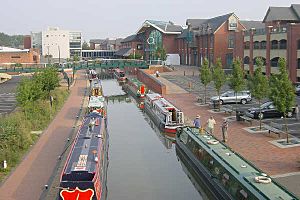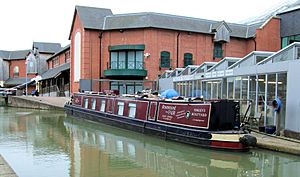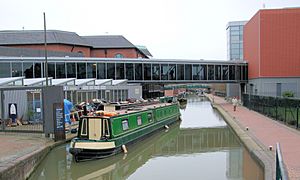Tooley's Boatyard facts for kids

Tooley's Boatyard is a very old dockyard located on the Oxford Canal in the heart of Banbury, Oxfordshire, England. It's a special place because it shows how important canals were for trade and travel a long time ago. Today, it's a famous historical site that helps us understand the past.
Contents
The Oxford Canal and Banbury
The Oxford Canal first reached Banbury on March 30, 1778. This was a big deal for the town! It meant Banbury could get coal from Warwickshire easily and cheaply. Before the canal, this area was mostly just wet fields.
In 1787, the canal was extended further south, finally reaching Oxford on January 1, 1790. An engineer from Banbury named John Barnes helped with this extension. The canal brought a lot of growth and wealth to Banbury. Even today, many people enjoy using the canal for boating.
Britain's Oldest Dry Dock
Tooley's Boatyard is home to the oldest working dry dock in Britain. A dry dock is a special basin that can be drained of water. This allows boats to be worked on and repaired out of the water. The boatyard was built to construct and fix the wooden, horse-drawn narrow boats that traveled along the new Oxford Canal.
This boatyard was very important during the Industrial Revolution in Banbury. It helped keep the boats moving, which transported goods and materials. Over time, roads and railways became more popular for moving things. However, the canals became important again locally during the Second World War.
A Famous Boatyard
Tooley's Boatyard was made famous by a book called Narrow Boat. This popular book was written by Tom Rolt in 1944. The book was re-released in the 1990s when the boatyard was in danger of closing.
The boatyard kept working until 1995. Today, it is a protected historical site called an Ancient Monument. A private company now runs it to preserve its history.
What You Can See There
The workshops at Tooley's Boatyard have been fully restored. They look just like they did in the 1930s! You can see a carpenter's store, where wood was shaped and repaired. There's also a machine workshop that used to be powered by steam. You can even find a paint store and a 200-year-old forge. In the forge, a blacksmith still works, shaping metal with fire and tools.
On August 7, 2010, a special blue plaque was placed at Tooley's Boatyard. This plaque honors Tom Rolt, the author of Narrow Boat. It was put there as part of the celebrations for 100 years since his birth.



